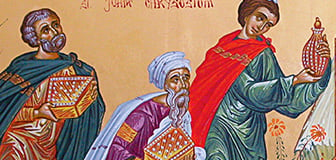“Whatever you do, work at it with all your heart,
as working for the Lord, not for men….”
Colossians 3:23
Saint Phocas was a gardener and Saint Euphrosinos was a cook. They are not known as “Phocas the Great” or “Euphrosinos the Theologian.” Known instead by the work they did, they became saints of the Church. We know that service to God and His Church is sacred, and because of this we strive to serve and support the Church. But is it possible for our work to be sacred? Can we be Christian stewards of our work? According to Saint Porphyrios, “At your work, whatever it may be, you can become a saint through meekness, patience, and love.”
In the second chapter of the Old Testament Book of Genesis we read, “The Lord God took the man and put him in the Garden of Eden to work it and take care of it”(Genesis 2:15). God put man in the garden to work. It is part of God’s plan for us that we work. In Exodus we read, “Six days you shall work, but on the seventh day you shall rest….” The world has changed, very few of us are called to work the land, and our work week may not be six days, yet we are created and called by God to work, and we can serve him through our work.
Some are blessed to follow a career path to a life’s work bringing satisfaction. Others may work in a position that may not appear to be spiritually or emotionally fulfilling. In whatever type of work we find ourselves, our work can become sacred when we dedicate it to God. In the words of Mother Theresa, “Wherever God has put you, that is your vocation. It is not what we do, but how much love we put into it.”
Life on earth is a gift. The work we do is also a gift if we see it as an opportunity to serve God and others. Saint Paul instructs us, “Whatever you do, work at it with all your heart, as working for the Lord, not for men….” (Colossians 3:23). When we see our work in this way, we are able to become Christian stewards of our work.
Stewardship of work teaches us that we don’t own our work, our position, our title. We are only stewards of a position for a period of time. We are responsible to fulfill our duties and also to prepare it for the person that will follow us in that position. We may also have the opportunity to mentor the person that will assume our position when we move on, empowering them to apply their particular gifts and talents to take the position to the next level.
Christian stewardship of work also teaches us that we are responsible to those with whom we work and those that may be served by our work. We are called to reflect the light of Christ in their lives, encourage them, support them and even love them. We are also stewards of our co-workers inasmuch as we cooperate and support them in their efforts for the good of all.
Saint Phocas the Gardener lived in the late 3rd Century, in the ancient region of Paphlagonia (now northern Turkey). Phocas lived humbly on the sale of fruits and vegetables he would grow in his garden. Through his work, Phocas fed the hungry and gave shelter to those in need. Because of his dedication to his work and his generosity to those in need, he became a Christian example to others. Even the non-believers treated him with respect, and by his Christ-like manner, many were drawn to the Christian Faith.
Saint Euphrosynos worked as cook in a monastery in Palestine, serving the brother monks humbly and faithfully. The others were not aware of the depth of his spiritual growth until it was revealed in a dream to a priest-monk of the monastery and then related to the brother monks. Euphrosynos is known to us by his humble work – Saint Euphrosynos the Cook.
In times of trouble or worry, especially over our career, we call upon God to strengthen us, to provide opportunity and to bring us success. When we achieve some measure of worldly success, it is easy to say to ourselves as we read in the Old Testament Book of Deuteronomy (8:17), “My power and the strength of my hands have produced this wealth for me.” But the next verse quickly reminds us, “Remember the Lord your God, for it is he who gives you the ability to produce wealth.”
As Christian Stewards we are called to give back to God from the “first fruits” of our labor. We support our parish and her ministries in an intentional way and not with only what it left after everything else has been taken care of.
In whatever work we do, we are called to give glory to God for the abilities and opportunities he provides. We do this by caring for the work we do, applying our God-given abilities to our work, and by respecting the responsibilities with which we have been entrusted. We do our best and give the glory to God.
TEXT:
